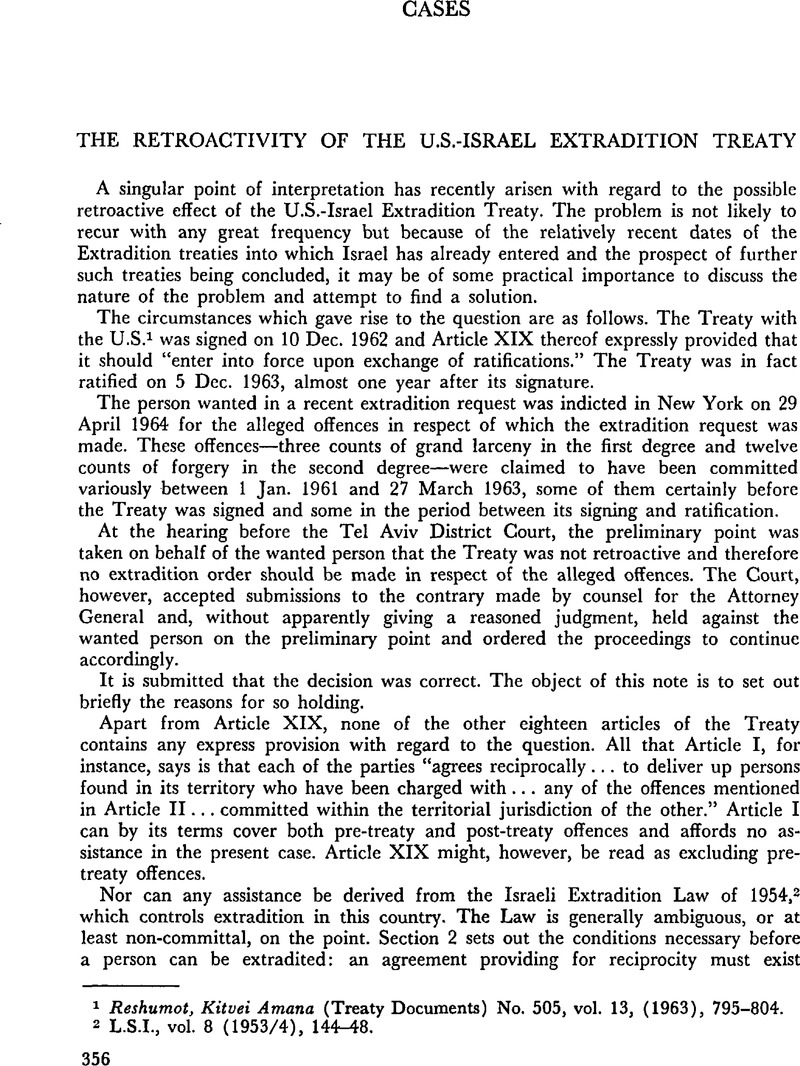No CrossRef data available.
Published online by Cambridge University Press: 12 February 2016

1 Reshumot, , Kitvei Amana (Treaty Documents) No. 505, vol. 13, (1963), 795–804.Google Scholar
2 L.S.I., vol. 8 (1953/4), 144–48.
3 See e.g. Oppenheim-Lauterpacht (8th ed. 1963), vol. I, pp. 950–58; Hyde, C. C., International Law (2nd ed.) vol. II, pp. 1468–73, 1498–1502Google Scholar; O'Connell, D. F., International Law (1965) vol. I, pp. 278–83Google Scholar; Starke, J. G., International Law (4th ed.) pp. 317–20.Google Scholar
4 An error seems to have crept into the English language version as officially printed in Reshumot, where instead of “more” the word “made” appears.
5 See Clarke, E., Extradition (1903) Ch. IGoogle Scholar; Re Arton [1896] 1 Q.B. 108, 111, 513; O'Connell, op. cit., vol. II, pp. 792–93.
6 Supplement to (1935) 29 A.J.I.L. at pp. 356–434.
7 Ibid., p. 393.
8 Ibid., p. 411.
9 Ibid., p. 374.
10 See the texts in Clarke, op. cit., pp. lxxxii–ccccxci.
11 Ibid., p. ccxvi, Article IV.
12 Ibid., p. cccxxxix, Article XIX.
13 Ibid., p. ccccxxv, Article III.
14 Ibid., p. cccclxxiv, Article VIII.
15 See the text in Harvard Research, pp. 316–20.
16 Travers, M.Le droit pénal international (1921), vol. IV, pp. 726–33.Google Scholar
17 Ibid., p. 732.
18 At pp. 316–56.
19 Ibid., p. 340, Article 25.
20 Ibid., pp. 274–96.
21 Ibid., pp. 300–01.
22 Moore, J. B., A Digest of International Law, vol. IV, p. 269.Google Scholar
23 Hyde, op. cit., 1042.
24 At p. 80.
25 (1933) 31 Mich. L.R. 546.
26 See Clarke, op. cit., pp. 131–33.
27 Ibid., p. 82.
28 For the facts and a summary of the judgment see Travers, op. cit., pp. 727–31.
29 Ibid., pp. 729–30, n. (1).
30 ibid., p. 726.
31 Michigan Law Review (1933), 544–48 and particularly 548, n. 18.
32 (1933) 27 A.J.I.L., 129–30.
33 See the cases cited in Moore, op. cit., pp. 257–58, of surrenders to the U.S. notwithstanding the absence of a treaty.
34 Mention might be made of the case Ex p. LoDolce of 1952, referred to by L. C. Green in 6 Current Legal Problems (1953), p. 291, in which an American soldier was held not to be extraditable for an offence committed whilst on war service in Italy. This case turned on the common practice of including in a peace treaty provisions for the revival of pre-war extradition treaties. The refusal to extradite would appear to be a strong argument against retroactivity but the true ratio of the decision is that under conditions of war the jurisdiction of the Italian courts had been severed or abandoned in the areas occupied by the U.S. forces and further that U.S. military tribunals had exclusive jurisdiction over persons in military service. The revival of the treaty could not restore to the Italian courts their jurisdiction.
35 In conversation by Professor A. V. Levontin.
36 Laws of Palestine (ed. Drayton, R. H.) (1934) vol. I, 677–92.Google Scholar
37 See Clarke, op. cit., Ch. I.
38 See Harvard Research, pp. 32–35.
39 Italy 1957, France 1958, Switzerland 1958, S. Africa 1959, Gt. Britain 1960 and Austria 1961, and Sweden, 1964.
40 Luxemburg 1956, Belgium 1957, Netherlands 1957 and the U.S. 1963.
41 Cf. Starke, op. cit, pp. 317–18.